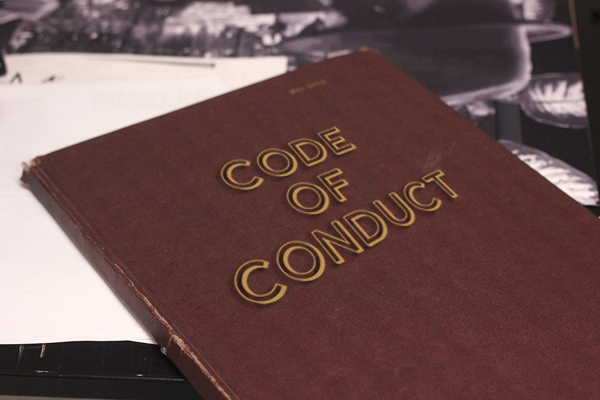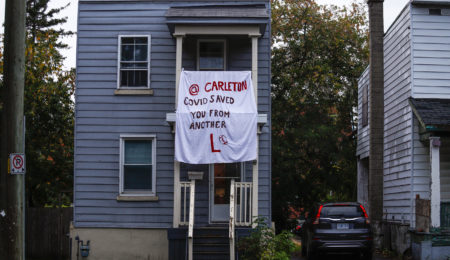Rumours about an impending student code of conduct have been circulating since Allan Rock took office as university president in 2008. Over the years, elected Student Federation of the University of Ottawa (SFUO) officials have raised concerns that students should not be penalized academically for non-academic infractions. Since 2008, Rock has responded to these concerns by saying that introducing a code of conduct was not a priority for him.
This has appeared to be true, until now.
In the past year, discussions about rape culture have come up on campuses across the country. At the University of Ottawa, this has been underlined by inappropriate messages about Anne-Marie Roy on Facebook and two varsity hockey players being charged with sexually assaulting a woman while travelling with the team last winter. Both the SFUO and university administration have stated intentions to address systemic and organizational weaknesses on campus that help prop up a culture where this kind of behaviour is considered acceptable. However, it is difficult to address student behaviour directly because the university is not supposed to have jurisdiction over non-academic behaviour.
Except they do. Sometimes.
A report by the university ombudsperson has revealed that students are sometimes barred from being on campus, and therefore attending class, due to non-academic infractions reported to Protection Services. Some infractions are reported to the deans of the students’ faculties and some are not. Without a clear policy in place on how to deal with these infractions, it’s unclear what the university expects Protection Services to do. This is where a code of conduct might not be a bad idea.
No one wants to have their university career derailed by actions made in their private lives. But when students engage in behaviour that puts others at risk and the university is made aware of this, it seems reasonable that action should be taken to protect the rest of the student body. What’s more disconcerting than being penalized for non-academic infractions is an inconsistent system of applying sanctions without an appeals process. Without a code of conduct, the university is in a position where they can respond to infractions however they want and students have no recourse.
While the SFUO raises reasonable concerns about the blurring of lines between private and public life, the reality is that those lines are already blurred. Not just at the university, but throughout modern society. If someone posts a tweet their company feels is inappropriate, it’s expected that person could lose their job. We can argue the ethics of this, but it still stands as the reality we presently live in.
Many professions have governing bodies that define the standards practising professionals must live up to and there are specific sanctions and appeals processes in place if their members fail to meet these standards. For example, the Ontario College of Teachers outlines five standards of practice for their members, not to monitor teachers’ daily lives, but to ensure that parents and students can expect a level of professionalism from members of the college. Should a teacher fail to meet one of these standards, there is a set process by which complaints are addressed, including an appeals process.
The most frightening implication of not having a code of conduct at the U of O is that students presently don’t know what standards they are being held to, and they also don’t know what disciplinary measures they might face if they fail to meet these unknown standards.
A code of conduct is not an infantilizing body set up to treat university students like children, but a set of standards that makes sure that everyone is on the same page. Student expectations are made clear. Expectations for Protection Services and any other university body involved in meting out sanctions are also clear. Further, a system of appeals is put in place when disputes do occur.
Rather than resisting, the SFUO ought to make efforts to be part of the conversation on what goes into the code of conduct. Students want to feel safe at their school and this is an opportunity to ensure policy is not reinforcing systemic issues like sexual violence.
There is a time for protest and sometimes that is the best way to protect student interest. This is not one of those times. Students are already being sanctioned for non-academic infractions, and when the safety of other students is in question, that is entirely appropriate.
What the SFUO needs to do to protect student interests is to stop shutting down the conversation and make sure they get a seat at the table. The university created a task force to decide what should go into a code of conduct. This is happening. The best thing the SFUO can do is put down the protest signs and speak up for students.





